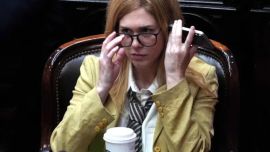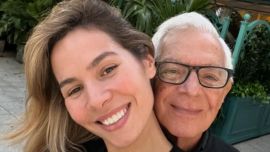President Alberto Fernández announced Friday that he will not run for second term in office, increasing uncertainty ahead of the October elections and throwing the race for the Casa Rosada wide open.
"Next December 10, 2023, is the exact day on which we celebrate 40 years of democracy,” said the Peronist leader in a seven-minute video posted online. “On that day I will hand over the presidential sash to whomever has been legitimately elected at the ballot box by popular vote.”
Fernández's announcement, delivered via a seven-minute montage of images and clips accompanied by melancholic music, came just hours before a meeting of the Peronist national council. The Frente de Todos leader did not address the camera in the video, titled ‘My Decision,’ and only appeared via narration.
The president’s withdrawal from the race comes with Argentina in the grip of runaway inflation and another bout of economic and financial instability.
The dollar has soared to record highs against the peso on parallel exchange rates in recent days and Central Bank reserves are running worryingly low. Foreign currency inflows have been decimated by the country’s worst drought on record and soaring inflation is crushing purchasing power, with consumer prices up 104 percent over the last 12 months.
Explaining his decision, the president said that he would “never put personal ambition before the needs of the people as a whole.”
Government sources briefed local media that the president “has decided not to run for re-election” in order to “concentrate on solving the problems of the Argentines."
They said the 64-year-old would be “at the forefront of the PASO [primary] and election campaign.”
The first round of Argentina’s presidential election is scheduled to take place on October 22, with a possible run-off on November 19. Tickets must take 45 percent of the vote or 40 percent and hold a 10-point difference over their rival to win outright.
PASO primaries to decide the candidates are to be held on August 13.
Offering a balance of his administration, Fernández said in his statement that he had taken office facing an “extreme situation,” with Argentina afflicted by high inflation and heavy indebtedness.
He went on to highlight the devastating impact of the global coronavirus pandemic on lives and the nation’s economy, as well as the fall-out from the war on Ukraine and the “brutal drought” now facing the country.
"I have to focus my efforts, commitment and heart on solving the problems of Argentines," insisted the president, ending the mini-review.
The Noticias Argentinas news agency reported Friday that the president had made his decision only last night after returning from an event in Mar del Plata and huddling with his closest advisors. His communications team are said to have “worked all night so that the video would be released early today.”
Ruling coalition
Fernández’s announcement means there is no clear frontrunner for the ruling coalition’s candidacy. A fierce battle to win the nomination will now begin, with jostling for the position set to begin in earnest.
Vice-President Cristina Fernández de Kirchner has said she will not stand in October, though clamour for the former president to declare her candidacy will now increase.
She made her announcement days after she was convicted of corruption dating back to her 2007-2015 terms in office and banned from holding political office. She currently enjoys parliamentary immunity and the sentence has not been confirmed by a higher court.
Some analysts have tipped Interior Minister Eduardo ‘Wado’ de Pedro as a candidate who could represent the Kirchnerite wing of the ruling coalition.
Economy Minister Sergio Massa was hotly tipped last year as an appealing candidate who could win over centrist voters, but the recent economic downturn has damaged his candidacy.
Daniel Scioli, Argentina’s ambassador to Brazil, is the only leading politician from the ruling coalition to have officially declared his intention to run. A former presidential candidate, Scioli lost the 2015 election to Mauricio Macri, Fernández’s predecessor in office. Social leader Juan Grabois is also in the race, though he is unlikely to garner much support.
Cabinet Chief Agustín Rossi has previously stated that he would consider throwing his hat in the ring, but only if Fernández stepped aside.
Fernández said in his video that it is necessary to “generate a new virtuous cycle” in which “others are empowered.”
In a nod to tensions within the ruling coalition over the government’s direction, he said he had always “avoided any escalation of conflicts” in order to “guarantee the unity of our political space.”
"I believe that the PASO [primaries] are the vehicle for society to select the best men and women from our front who will best represent us,” added the president. “As president of the Justicialist Party [PJ, Peronist] I will guarantee that all those who feel qualified can do so.”
Pledging his support for the eventual nominee, Fernández vowed in his video statement to “work fervently so that he or she will be a colleague from our political space who represents those of us who continue and will continue to fight for a just homeland, with equality and happiness for all.”
Opposition hopefuls
News of the president’s withdrawal comes less than a month after Macri announced he would not seek the opposition’s nomination in the PASO primaries. The former president, who lost the 2019 election to Fernández, has not said who he will support this time out.
The opposition Juntos por el Cambio coalition's candidate is expected to be PRO leaders Horacio Rodríguez Larreta or Patricia Bullrich.
Acknowledging the electoral campaign ahead, President Fernández highlighted that Argentina is celebrating four decades of democracy and called on all the candidates to compete in good faith.
"I call on all of us to go through this electoral period, which is so prone to excess, with the greatest respect for our opponents," he proposed.
“We can all make a genuine contribution from public spaces to improve the political debate we deserve,” declared the head of state.
As well as a president and vice-president, Argentina will refresh half of its 257-member lower house Chamber of Deputies in October, as well as a third of the 72-seat Senate.


























Comments